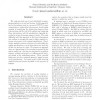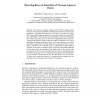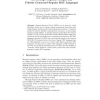17 search results - page 2 / 4 » Detecting implied scenarios in message sequence chart specif... |
EVOW
2004
Springer
13 years 10 months ago
2004
Springer
An evolutionary approach to design communication protocols from scenario-based specifications is presented. It enables to automatically generate finite-state models of protocol ent...
ISOLA
2010
Springer
13 years 3 months ago
2010
Springer
We give a detailed construction of a finite-state transition system for a com-connected Message Sequence Graph. Though this result is fairly well-known in the literature there has...
SEFM
2008
IEEE
13 years 11 months ago
2008
IEEE
The only practical way to test distributed messagepassing systems is to use local testing. In this approach, used in formalisms such as concurrent TTCN-3, some components are repl...
TACAS
2007
Springer
13 years 11 months ago
2007
Springer
Abstract. The analysis of message sequence charts (MSCs) is highly important in preventing common problems in communication protocols. Detecting race conditions, i.e., possible dis...
ICALP
2000
Springer
13 years 9 months ago
2000
Springer
Message Sequence Charts (MSCs) are an attractive visual formalism widely used to capture system requirements during the early design stages in domains such as telecommunication sof...



